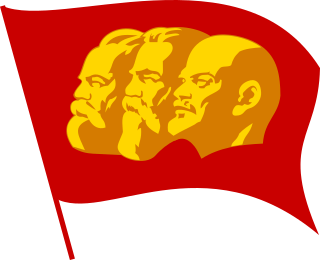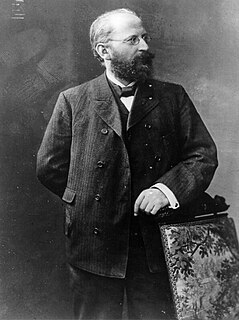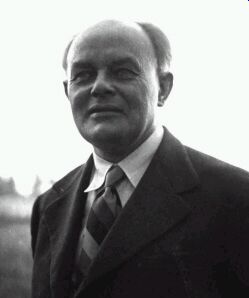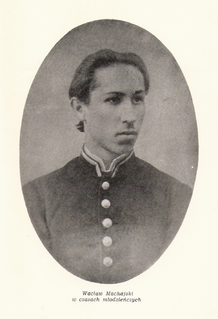
Leninism is the political theory for the organisation of a revolutionary vanguard party and the achievement of a dictatorship of the proletariat as political prelude to the establishment of socialism. Developed by and named for the Russian revolutionary Vladimir Lenin, Leninism comprises socialist political and economic theories, developed from Marxism and Lenin's interpretations of Marxist theories, for practical application to the socio-political conditions of the Russian Empire of the early 20th century.

In political science, Marxism–Leninism was the official state ideology of the Soviet Union (USSR), of the parties of the Communist International, after their Bolshevisation, and is the ideology of Stalinist political parties. As Stalin's synthesis of Leninism, the political praxis of Lenin, and of Marxism, the politico-economic theories of Karl Marx, the purpose of Marxism–Leninism is the transformation of a capitalist state into a socialist state, by way of two-stage revolution, guided and led by a vanguard party of professional revolutionaries, drawn from the proletariat. To realise the two-stage transformation of the state, the vanguard party establishes the dictatorship of the proletariat, which determines policy with democratic centralism.
State capitalism is an economic system in which the state undertakes commercial economic activity and where the means of production are organized and managed as state-owned business enterprises, or where there is otherwise a dominance of corporatized government agencies or of publicly listed corporations in which the state has controlling shares. Marxist literature defines state capitalism as a social system combining capitalism with ownership or control by a state—by this definition, a state capitalist country is one where the government controls the economy and essentially acts like a single huge corporation, extracting the surplus value from the workforce in order to invest it in further production. This designation applies regardless of the political aims of the state and some people argue that the modern People's Republic of China constitutes a form of state capitalism and/or that the Soviet Union failed in its goal to establish socialism, but rather established state capitalism.
Trotskyism is the theory of Marxism as advocated by the Russian revolutionary Leon Trotsky. Trotsky identified as an orthodox Marxist and Bolshevik–Leninist. He supported founding a vanguard party of the proletariat, proletarian internationalism and a dictatorship of the proletariat based on working class self-emancipation and mass democracy. Trotskyists are critical of Stalinism as they oppose Joseph Stalin's theory of socialism in one country in favor of Trotsky's theory of permanent revolution. Trotskyists also criticize the bureaucracy that developed in the Soviet Union under Stalin.

Eduard Bernstein was a German social-democratic Marxist theorist and politician. A member of the Social Democratic Party (SPD). Bernstein had held close association to Karl Marx and Friedrich Engels, but he saw flaws in Marxist thinking and began to criticize views held by Marxism when he investigated and challenged the Marxist materialist theory of history. He rejected significant parts of Marxist theory that were based upon Hegelian metaphysics and rejected the Hegelian dialectical perspective.

Otto Rühle was a student of Alfred Adler and a German Marxist active in opposition to both the First and Second World Wars.
The Nagoya Anarchists were a group of anarchists in Nagoya, Japan that included Bin Akao(赤尾敏) and Susumu Fukuda(福田進). In 1918 they joined the Rousoukai(老壮会), The Society for Old Combatants. A group that gravitated towards ultranationalism, they became monarchists but retained a fierce anti-capitalist viewpoint, becoming state socialists and national socialists. They were primarily active amongst students. With Shinkichi Uesugi(上杉慎吉)(1878-1929) and Motoyuki Takabatake(高畠素之) (1886-1928), they formed the Kenkokukai(建国会), The League of State Construction(経綸学盟).
The Kenkokukai (建国会) was a Japanese secret society founded in April 1926. It was formed by the National Socialist Motoyuki Takabatake (高畠素之), Nagoya Anarchists Shinkichi Uesugi (上杉慎吉) and Bin Akao (赤尾敏). It proclaimed its object to be "the creation of a genuine people's state based on unanimity between the people and the emperor".

New Democracy or the New Democratic Revolution is a concept based on Mao Zedong's "Bloc of Four Social Classes" theory in post-revolutionary China which argued originally that democracy in China would take a decisively distinct path to that in any other country. He also said every third world country would have its own unique path to Democracy, given that particular country's own social and materialist conditions. Mao labeled representative democracy in the Western nations as "Old Democracy," characterizing parliamentarianism as just an instrument to promote the dictatorship of the bourgeoise/land owning class through manufacturing consent. He also found his concept of New Democracy in contrast with the Soviet-style Dictatorship of the Proletariat which he figured would soon take over most of the world. Mao spoke about how he wanted to create a New China, a country freed from the feudal and semi-feudal aspects of its old culture as well as Japanese Imperialism. Thus he wanted to create a new culture through Cultural Revolution, a new Economy free from the land owners, and in order to protect these new institutions, a New Democracy of the four revolutionary classes; Peasants, Proletariat, Intelligentsia, and Petit Bourgeoise. He said in the Third World, only these four classes can lead a thorough enough United Front against the Imperialists, as the National Bourgeoise of China must take Counter-revolutionary measures to protect its own feudal practices of slavery through land rent, violently shutting down any anti-imperialist revolutionary movement that threatened the interests of the land owners.

In political and social sciences, communism is the philosophical, social, political, and economic ideology and movement whose ultimate goal is the establishment of the communist society, which is a socioeconomic order structured upon the common ownership of the means of production and the absence of social classes, money, and the state.

The two-stage theory, or stagism, is a Marxist–Leninist political theory which argues that underdeveloped countries such as Tsarist Russia must first pass through a stage of capitalism before moving to a socialist stage.

Jan Wacław Machajski, pseudonym A. Wolski, was a Polish revolutionary whose methodology drew from both anarchism and Marxism whilst criticising both as being products of the intelligentsia.
State socialism is a classification for any socialist political and economic perspective advocating state ownership of the means of production either as a temporary measure in the transition from capitalism to socialism, or as characteristic of socialism itself. It is often used interchangeably with state capitalism in reference to the economic systems of Marxist–Leninist states such as the Soviet Union to highlight the role of state planning in these economies, with the critics of said system referring to it more commonly as "state capitalism". Libertarian and democratic socialists claim that these states had only a limited number of socialist characteristics. However, Marxist–Leninists maintain that workers in the Soviet Union and other Marxist–Leninist states had genuine control over the means of production through institutions such as trade unions.

Marxism and the National Question is a short work of Marxist theory written by Joseph Stalin in January 1913 while living in Vienna. First published as a pamphlet and frequently reprinted, the essay by the ethnic Georgian Stalin was regarded as a seminal contribution to Marxist analysis of the nature of nationality and helped to establish his reputation as an expert on the topic. Stalin would later become the first People's Commissar of Nationalities following the victory of the Bolshevik Party in the October Revolution of 1917.
Agrarian socialism is a political ideology which combines an agrarian way of life with a socialist economic system.
Revolutionary socialism is the socialist doctrine that social revolution is necessary in order to bring about structural changes to society. More specifically, it is the view that revolution is a necessary precondition for a transition from capitalism to socialism. Revolution is not necessarily defined as a violent insurrection; it is defined as seizure of political power by mass movements of the working class so that the state is directly controlled or abolished by the working class as opposed to the capitalist class and its interests. Revolutionary socialists believe such a state of affairs is a precondition for establishing socialism and orthodox Marxists believe that it is inevitable but not predetermined.

Socialism in one country was a theory put forth by Joseph Stalin and Nikolai Bukharin in 1924 which was eventually adopted by the Soviet Union as state policy. The theory held that given the defeat of all the communist revolutions in Europe in 1917–1923 except Russia, the Soviet Union should begin to strengthen itself internally.

World revolution is the Marxist concept of overthrowing capitalism in all countries through the conscious revolutionary action of the organized working class. These revolutions would not necessarily occur simultaneously, but where and when local conditions allowed a revolutionary party to successfully replace bourgeois ownership and rule, and install a workers' state based on social ownership of the means of production. In most Marxist schools, such as Trotskyism, the essentially international character of the class struggle and the necessity of global scope are critical elements and a chief explanation of the failure of socialism in one country.
A socialist state, socialist republic, or socialist country is a sovereign state constitutionally dedicated to the establishment of socialism. The term "communist state" is often used interchangeably in the West specifically when referring to single-party socialist states governed by Marxist–Leninist political parties, despite these countries being officially socialist states in the process of building socialism. These countries never describe themselves as communist nor as having implemented a communist society. Additionally, a number of countries which are not single-party states based on Marxism–Leninism make reference to socialism in their constitutions; in most cases these are constitutional references alluding to the building of a socialist society that have little to no bearing on the structure and development paths of these countries' political and economic systems.

Karl Johann Kautsky was a Czech-Austrian philosopher, journalist, and Marxist theoretician. Kautsky was recognized as among the most authoritative promulgators of Orthodox Marxism after the death of Friedrich Engels in 1895 until the outbreak of World War I in 1914.












